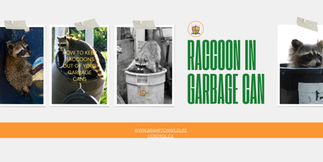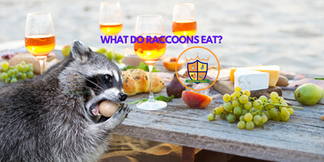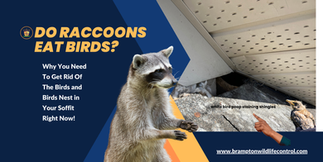Do Raccoons Hibernate?
- Brampton Wildlife Control Inc.

- Nov 19, 2024
- 2 min read
Updated: Dec 25, 2024

Where Do Raccoons Go in the Winter?
While it is true that raccoons can stay inside an attic for extended periods in the winter without food or water, they do not actually hibernate like other animals. Raccoons do however enter winter torpor, a different state from true hibernation.
This guide helps homeowners understand raccoon behaviour in the winter to avoid problems like trapping them inside the attic because there was no noise and you thought they were gone.
Understanding Winter Torpor vs True Hibernation
The hibernation induction trigger affects how animals enter hibernation. Raccoons show different patterns:
Sleep patterns vary as raccoons slow their activity
Torpor lets raccoons wake easily
Not all animals hibernate fully
Fewer raccoons move during cold days
Animals prepare differently for winter survival
Most raccoons maintain higher body temperatures than animals enter hibernation states. Unlike hibernation, raccoons can wake and find food when needed.
Detailed Winter Shelter Selection
Raccoons choose hollow spaces carefully:
Tree cavities provide natural shelter
Fallen tree trunks offer protection
Attic or crawl spaces attract house raccoons
Urban areas provide many den options
Quiet animals share dens for warmth
House raccoons living in buildings often:
Prefer attics for winter shelter
Use crawl space areas
Create multiple den sites
Steal shelter from existing spaces
Share dens with other raccoons
Comprehensive Food Sources
Winter raccoons rely on various foods:
Human garbage becomes a primary source
Pet food attracts raccoon activity
Bird eggs provide protein
Dead vegetation offers some nutrition
Stored body fat helps survival
Raccoons prepare for winter by:
Breaking into trash cans
Raiding garbage cans
Finding pet feed sources
Taking missing chickens regularly
Looking for fallen tree trunks with insects
Extended Health and Safety Concerns
These greasy animals pose risks:
Spread diseases through contact
Carry pathogens in droppings
Cause salmonella poisoning risks
Create fire hazards in buildings
Damage structures when they steal eggs
When humans walk near raccoon dens:
Risk exposure to diseases
Might encounter several raccoons
Could face raccoon invasion
May find raccoon den sites
Notice raccoon mating season activity
Complete Prevention Strategies
To prevent future raccoon troubles:
Secure all pet doors
Remove pet food sources
Install safe and humane traps
Contact a professional wildlife control operator
Block entry to attic or crawl spaces
Additional prevention includes:
Securing fall garden areas
Protecting garbage cans
Removing easy food access
Managing other animals nearby
Installing proper barriers
Seasonal Behaviour Patterns
Raccoon mating season affects behaviour:
Reason raccoon mating season matters
Raccoons in the winter change activity levels
Impact on raccoon invasion risks
How raccoons live during breeding
When other raccoons gather
Important Safety Guidelines
For house raccoons control:
Never leave pet food outside
Secure all trash cans properly
Watch for fewer daylight hours impact
Monitor quiet animals near homes
Address raccoon problem promptly
Remember: Raccoons create problems when they find easy food and shelter. Understanding what raccoons eat and how they live helps prevent unwanted wildlife issues.

















Comments